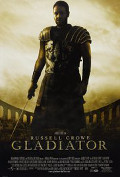
Directed by
Ridley Scott
155/171 minutes
Rated M
Reviewed by
Bernard Hemingway


Gladiator
Synopsis: The Roman Empire is at the height of of its power having just subdued Germania. Emperor Marcus Aurelius (Richard Harris) is close to death and in order to save the Rome from its own decadence, passes over his son, Commodus (Joaquin Phoenix) as successor, choosing instead his victorious General Maximus (Russell Crowe). Mad with jealousy, Commodus orders Maximus executed and murders his family. Maximus escapes and seeks his revenge.
Essentially an updating of Cinemascope classics such as Ben Hur (1959) and Spartacus (1960), and particularly indebted to the latter, Gladiator is an outstandingly well-made action adventure film built around the time-honoured myths of individual male heroism, one that also fires a broadside at populist politics and the psychology of the masses.
The essential simplicity of the well-worn plotline (the pursuit of revenge by the wronged hero) is masked by an extraordinary level of craftsmanship in every department from costume (Janty Yates won an Oscar for Costume Design) to music to cinematography but especially in the marvellous computer-enhanced imagery. The extent of the latter is somewhat of a drawback from the point of view of involvement and it also throws into question the label so commonly attributed to this film "epic". For despite its often panoramic sweep this is hardly an epic in the manner of Lean's Lawrence of Arabia, (1962) for instance, where being transported into reality of the vast emptiness of the desert was an integral element of the film's exploration of the legend. In Gladiator the vastness is a trick and thus is not an voyage into reality but an escape from it (e.g.when he discovered that the real Colosseum was too small for his purposes Scott order a super-sized one built).
Although he and writer David Franzoni pour on the sentimentality, Scott's direction, as one would expect, is masterful and he keeps his very limited material moving along nicely, from the opening set piece of the conquering of Germania to the final public showdown between the two main protagonists. The film deals largely with the tussle between Maximus and Commodus with both Crowe, who won the Best Actor Oscar, and Phoenix give compelling performances whilst Richard Harris and Oliver Reed provide solid support.
FYI: Reed died before the filming was completed, requiring some nifty re-writing and editing in order to resolve his character, the scenes of him giving the compound keys to Crowe, and his character's murder by praetorian guards both being manufactured in post-production.
There are various versions of the film doing the rounds. Universal's 2005 Special Extended Version adds an extra 16 minutes or so to the Director's Cut and overall this is the better version. All the characters seem much more substantial with Joaquin Phoenix getting more screen time including a striking scene between himself and Quintus after he finds out that Maximus is alive and Connie Nielsen also making more of an impression. The score was by Hans Zimmer and Lisa Gerrard although because of Academy regulations, only Zimmer was Oscar-nominated.
Want something different?





